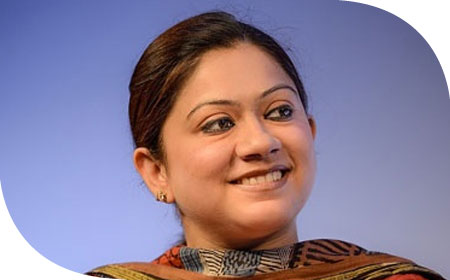
Divya Keshav – Owner, Krishna Printernational in India

Turning It Around
By Caroline Cox
Following in your father’s footsteps in business usually means big shoes to fill – even bigger when you’re the daughter – especially one with little experience.
But that’s what Divya Keshav did when she became owner and manager of label manufacturing company, Krishna Printernational. Her father started it 40 years earlier. She came on board in 2008 to prevent the Delhi-based company from closing and hasn’t looked back since.
Keshav turned the floundering venture into a success, growing the staff from 20 to more than 30 and boasting a nearly 300 percent increase in sales revenue. The married New Delhi native with a bachelor’s degree in commerce, is also the first in her industry to hire and promote female machine operators and offer two months paid maternity leave.
Here, she talks to Little PINK Book about patience, thriving in a male-dominated industry and the importance of valuing others.
Little PINK Book: What’s your success secret?
Divya Keshav: I focus a lot on human capital. I listen to my employees and what they want. I believe in sharing my success with them.
LPB: What’s the biggest risk you’ve taken for your career?
DK: The biggest risk was changing from my job to my business. Initially I thought I would not be accepted, because there are only a handful of women in leadership positions in my industry in north India. I was working for an online company that promotes small-scale businesses, to running my own business. I [questioned] if I would be able to move.
LPB: What’s the biggest obstacle you faced?
DK: I am in a male-dominated industry. I had a hard time being accepted by my employees, [many of whom] were 10 to 15 years older. Initially they thought I was bossy. If I asked them to do a particular thing they would do the opposite. It took me almost two years to feel accepted… with patience and changing my leadership style to make it more participative. If I wanted to implement a new idea, I would talk to my employees and try getting an answer from them.
LPB: How do you maintain client loyalty?
DK: There was a client who needed a solution for security stickers in the airline industry. The sticker he wanted was very costly. As an expert, I knew he could have it at half of the price. I knew I wouldn’t make as much. But it would be more cost effective for my customer. Instead of focusing on short-term profit, I chose to nurture that relationship with my customer and give him a cost effective label. That day I knew I had made a long-term relationship with that customer.
LPB: What’s the biggest challenge faced by professional women today?
DK: We don’t always value ourselves as much as we should. That stems from a lack of confidence we have in ourselves. Women are so intelligent, but some of us aren’t as successful as we could be because we don’t believe in ourselves or we think others are superior. The main thing we need to work on is being in-check with our emotions. [Then] we’ll be fine.
LPB: What’s the best business advice you always turn to?
DK: I was given the best business advice from one of the top partners at Goldman Sachs. It was that to be successful, I have to get out of my comfort zone. When people are able to push their boundaries, take risks and try things they think they’re not so good at, they succeed in a big way.
LPB: How has your leadership style evolved?
DK: My leadership style keeps evolving. The longer you’re around other successful leaders, you learn to evolve and emulate what they’ve done. You have to have followers to be a leader. Participative leadership is the best style. I ask my employees to open up and give me advice. Sometimes they come to a better solution than I ever would have. That gives them control. They feel they are being listened to and are an important part of the company.

LPB: What’s your biggest weakness as a leader?
DK: I am really working on delegating. You feel that if you delegate the work, it’s not going to have the qualities you want. But I think that is wrong. When you delegate, you can focus on bigger things. And just because one person is not able to do well in one job doesn’t mean she cannot do well in another. Delegation requires giving the work to the right kind of person.
LPB: Tell me about your involvement with the 10,000 Women program.
DK: I learned about 10,000 Women from an advertisement in the National Daily. I applied for it and then graduated in January 2010. The program made me a more confident person. I have more focus and see things with a broader perspective. I used to only focus on my company, but now I also see the external environments, like how the industry is functioning and what’s happening around the country that may affect my business. I am much better negotiator. So I’m able to get bigger deals, more credit and better prices for my customers and vendors; [my] profits are rising.
LPB: How have your employees benefited?
DK: I’m training more women to be machine operators and providing more maternity leave. Many are working and tied up with children, but I am instilling the importance of education so their children will be sent to school, especially if they didn’t have that opportunity themselves.
LPB: How did your background result in your success today?
DK: My family has always been very encouraging. Though I’m a Hindu, I practice Buddhism also. At home my parents encouraged me at every step and said I should follow my dreams and my heart. That resulted in the kind of choices I make. They always said, “You see all the paths you have and make a good choice after weighing all the pros and cons.” They left [the choice] up to me.
LPB: What is the difference between doing a job and running your own business?
DK: When you are doing a job, its just one part of a business. But handling the business is like not having any security net. I would have to handle everything. But I am so glad I pushed myself and faced all the challenges that there were. Like I said, we have to push our boundaries to reap the benefits.
LPB: What are your top tips for Life/Work balance?
DK: Creating Life/Work balance has been easy because [growing up] I always saw my father at home by 6 or 6:30 every evening. He always made time to spend with my sister, my mother and me. Businessmen and entrepreneurs traditionally spend too much time at work, but I have always seen my dad at home, so that is how I create that balance.

LPB: What do you do to relax and rejuvenate?
DK: I love cooking and I am a Bollywood buff. I love to go to the movies and catch up with my friends in the evening.
LPB: What’s your favorite book?
DK: It’s How to Win Friends and Influence People by Dale Carnegie. That has to be my all-time favorite.
LPB: What’s one thing many people don’t know about you?
DK: I am really good at acting and mimicking. I wanted to be an actress, and that’s the only time my parents were not so encouraging. My friends called me a drama queen. [Laughs]. I’m good at comedy and drama.
LPB: What’s one goal you have yet to achieve?
DK: My goals keep changing over time, but as of now I feel that I have achieved whatever goals I have set for myself in the short-term. I keep setting new goals every now and then, but as of now, I am very happy.
LPB: What kind of legacy do you want to leave?
DK: Professionally and personally, I want to be an open human being who nurtures and values people. I think in the end it is all about valuing one another.
LPB: What’s your favorite quote?
DK: “I see no point in being the richest man in the cemetery” [Colonel Sanders]. That has guided me when I become over-aggressive or want to spend too much time at work. The balance I’ve created has helped me evolve personally and professionally.
LPB: How do you define success?
DK: Success is a relative term – what it means for me might not be what it means for you. At the end of the day, I believe that if I’m able to achieve what I wanted to, even just for that day, then I am successful.
Recommended
-
Do You Have The Imposter Syndr...June 18th, 2022
-
1 Key Email Marketing Tips For...January 6th, 2022
-
Six Tips For Choosing A PEO Se...September 20th, 2021
-
Top Women Profiles, PINK Lists...July 20th, 2021
-
Black Lives Matter. PINK Stand...June 15th, 2020
















